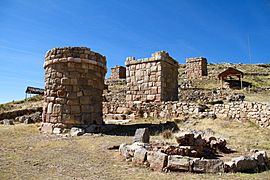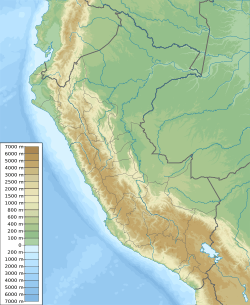Cutimbo facts for kids

Partial view of the archaeological site of Cutimbo.
|
|
| Location | Peru, Puno Region |
|---|---|
| Region | Andes |
| Coordinates | 16°01′15″S 70°00′08″W / 16.02083°S 70.00222°W |
| History | |
| Builder | Colla Kingdom |
| Associated with | Colla, Lupaca, Inca |
Cutimbo is an amazing ancient place in Peru. It has special stone tombs called chullpas. You can also find old cave paintings there.
The name Cutimbo might come from the Quechua language. It could mean "giant armadillo." This site is in the Puno Region, in a district called Pichacani. The Peruvian government has declared Cutimbo a National Cultural Heritage site. This means it is a very important historical place for the country.
What is Cutimbo?
Cutimbo is an archaeological site. This means it's a place where people study old human history. It's famous for its unique stone towers. These towers are actually tombs. They were built a long time ago.
Besides the tombs, there are also ancient cave paintings. These paintings show us what life might have been like back then. They give us clues about the people who lived in this area.
Who Lived at Cutimbo?
Many different groups of people lived in or used Cutimbo. The main builders were the Colla people. They were a powerful group in the Andes mountains. The Colla people built many of the impressive chullpa tombs.
Later, the Lupaca people also used the site. Finally, the mighty Inca took over the region. They also used Cutimbo for their purposes. This shows that Cutimbo was important for many different cultures over time.
What Can You See at Cutimbo?
The most striking features at Cutimbo are the chullpas. These are tall, round or square towers made of stone. They were used to bury important people. Imagine building such large structures without modern tools!
Inside some of the caves, you can find ancient rock art. These paintings often show animals, people, or symbols. They are like messages from the past. They tell us stories about the beliefs and daily lives of the ancient people.
Cutimbo is a fascinating place. It helps us learn about the rich history of the Andes region. It shows us how ancient cultures honored their dead and expressed themselves through art.
See also
 In Spanish: Cutimbo para niños
In Spanish: Cutimbo para niños
 | William L. Dawson |
 | W. E. B. Du Bois |
 | Harry Belafonte |


